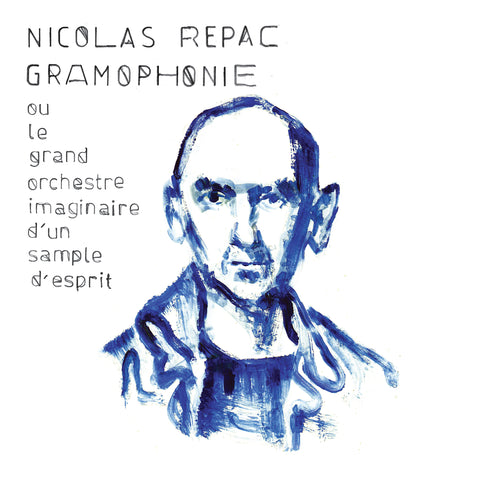Composed by Nicolas Repac, except
"Pleure pas Nelly" written and composed by Marc Fontenoy
"Roses Blanches" written by Charles Pothier and composed by Leon Raiter
Published by Nø Førmat! except
Pleure pas Nelly by Editions Beuscher Arpege
Roses Blanches by Meridian Editions
Patrick Goraguer - Piano sur Le Voyage Immobile et Harlem
Elisa Repac - Voix sur Pleure pas Nelly et Roses Blanches
Nicolas Repac - Voix sur Le Voyage immobile
Produced, recorded and mixed by Nicolas Repac
Mastered by par Alexis Bardinet & Lorenzo Bassaletti at Globe Audio Mastering, Bordeaux, France
(P) & © 2024, Nø Førmat!
In 2004, Nicolas Repac's album Swing Swing was one of the few references marking the birth of Paris-based record label Nø Førmat!. Already recognized in the world of “chanson” for his artistic complicity with Arthur H, but also for having written and produced a highly personal album of nocturnal and dreamlike atmospheres (La Vile), in Swing Swing, Repac highlighted a true “art of sampling” through an electro-joyful rambling around the big swing 30s jazz bands in their wildest state of great instinctive poetic power.
Twenty years later, Nicolas Repac has not only established himself as an inventive producer and arranger, continuing his long-term partnership with Arthur H and engaging in remarked collaborations with West African artists (Mamani Keita, Abou Diarra, Dobet Gnahoré). Applying and refining the compositional techniques experimented in Swing Swing to the worlds of blues (Black Box) and ethnomusicological recordings (Rhapsodic), he is one of the most original creators in the small world of contemporary European electronic music.
For its 20th year of existence, Nø Førmat! asked this long-time companion to delve back into the outdated, modernist imaginary of jazz from the Roaring Twenties, adding a volume to Repac’s cycles of sonic collages in a sort of sequel to Swing Swing. While a handful of rhythmically intoxicating tracks recapture the cheerful bazaar spirit that gave Swing Swing its joyously surrealist tone (Harlem, Scatastrophes and Swingphony), Nicolas Repac's Gramophonie expands his idiomatic and emotional territories, gently drifting the album's overall mood towards intimacy and melancholy. With a virtuoso technicality that never sacrifices creative spontaneity over control, Repac uses his machines less like an engineer than a poet, plunging into the heart of his unconscious to bring back, like a daydream notebook, a series of tracks freely associated, unfolding their hybrid and cinematic shapes in the form of cryptic and enigmatic confidences.
Maniacally reworking his samples like a mad scientist until extracting a form of poetic quintessence, Repac summons the spirits of a bygone world to portray our present - resonating in Moulin Bleu or Nuit Noire Place Blanche, for example, is the false recklessness of a version of Paris from a century ago. There is also a considerable autobiographical element in Gramophonie, which feels melancholic in most of the tracks, no matter how frenetically frenzied they may seem... And when Nicolas Repac suddenly conjures up, as if from a family document, his mother's weary voice to sing Pleure pas Nelly (“Don’t cry Nelly”), cloaked in a veil of heartbreakingly gentle strings, the raw emotion that embraces the listener perhaps finally touches the secret heart of this eminently personal album.
Biography
Born in Albi on December 11th, 1964, Nicolas Repac began his musical career as a self-taught musician, trying to reproduce the hits of Bob Dylan and Tom Waits by ear on the guitar, before finally composing his first songs and opening up to jazz and improvisation. Moving to Paris at the age of 23 to become a jazz guitarist, he bought his first synthesizers and drum machines and began to create music using machines and sequencers, soon adding the computer and sampler to his palette, a major instrument from which he gradually laid the foundations of his own universe. In the course of his many collaborations, he met singer/songwriter Arthur H, whom he helped produce the album Trouble-fête, inaugurating a collaboration that is still going strong over a quarter of a century later.
He also embarked on a solo career, signing a collection of songs, La Vile, for Label Bleu. Voted “best male hope” at the Francofolies festival in 1999, he developed his activities as a producer and arranger (Maurane, Alain Bashung...) and in 2004 recorded Swing Swing for the fledgling label Nø Førmat!, a mischievous, playful electro ramble around jazz from the 30s. The album's success opened up new horizons, including a collaboration with Malian singer Mamani Keita, again for Nø Førmat! which resulted in two albums (Yelema and Gagner l'argent français) blending jazz, rock, dub, Mandingo music and electronic music.
In 2007, Nicolas Repac released a new album of songs, La grande roue, while continuing his activities as a producer, and signed several film scores, including 21 nuits avec Pattie by the Larrieu brothers in 2015, Les enfants du 209 rue Saint-Maur, Paris 10e by Ruth Zilberman, Le poulain by Mathieu Sapin in 2018, and Le fils de l'épicière, le maire, le village et le monde by Claire Simon in 2020.
In the spirit and aesthetics of Swing Swing, he unveiled Black Box in 2012, a retro-futuristic ballad around blues, and in 2021 published Rhapsodic, based on sound documents drawn from the treasures of ethnomusicologist Charles Duvelle's “Prophet” collection.
